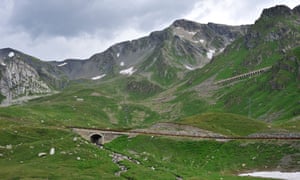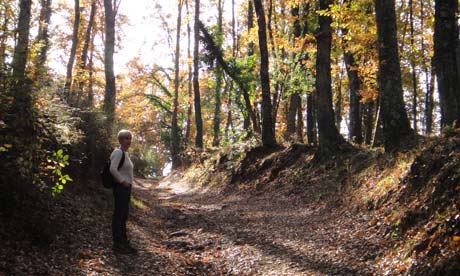
The Crossway by Guy Stagg review – a 3,400-mile walk to Jerusalem.The pilgrimage described in this engagingly honest memoir is not a religious one, though there’s plenty of pain and privation
t’s in April, Chaucer said, that people long to go on pilgrimages. But Guy Stagg began his on 1 January. And the destination wasn’t Canterbury but Jerusalem, along the Via Francigena, 3,420 miles away, which, among other things, meant crossing the Alps in the middle of winter – alone, on foot, and with little more equipment than a borrowed pair of snow shoes. After which, most of the journey, and all its many challenges, still lay ahead. Crazy or what? Even the spiritual-minded might think his quest unwise.
But faith isn’t what drove him. He stopped believing in God as a teenager. Despite the odd preparatory hike, he wasn’t much of a walker, either (“My legs are short, my stride hurried – an anxious wasteful gait”). Behind his decision to “wander out of my life” for the next 10 months was the nervous breakdown he’d had before. “I thought the journey might build me up again,” he says. “I walked to mend myself.” Solvitur ambulando. His issues would be solved by walking.

In Switzerland, Guy Stagg ‘is warned the Great Saint Bernard Pass is far too dangerous to tackle in February but does so anyway, in a blizzard’.
There are more trials to come, including sickness bouts, scary border guards and encounters with zealots and oddballs
The idea is an old one, with many medieval precedents. But the model for Stagg was more recent: Benoît-Joseph Labre, “patron not only of pilgrims, but also of vagrants, unmarried men and the mentally ill”, who wandered through western Europe for seven years in the 1770s, covering more than 30,000 km. Still, even he didn’t make it to Jerusalem. Could Stagg?
The early signs aren’t good. In a single day, he splits his boots while wading waist-deep in snow, falls off a wooden footbridge into a stream, and has to sprint for his life along railway tracks when a train emerges from a tunnel. And then there’s the Great Saint Bernard Pass, which he’s warned is far too dangerous to tackle in February but does so anyway, in a blizzard. Other hazards and setbacks quickly follow. Whenever he wavers, he remembers his depression and thoughts of suicide the year before. Only by pushing on can he get free of the past.
No one else he meets is walking as far as Jerusalem and, though he occasionally falls in step with a fellow hiker, he prefers to go it alone. Solitude allows for greater attentiveness to landscape and he dutifully searches for metaphors to honour its variety: “the mountains were shining plates of armour”, “frozen puddles scattered the dawn like smashed gemstones”, “sunlight spread” on a lake’s surface “like sequins sewn into the water”, “stars filled the night like metal filings”. Alone by day, at night he looks to strangers to take him in – monks, priests and nuns mostly. And they do, without exception, offering shelter and serving up meals; one woman, a volunteer cook in a convent, even washes and kisses his feet. He’s also taught history lessons – about saints, martyrs, heretics, hermits and flagellants. Monastic life is a form of imprisonment, he says; with a pilgrimage you’re on the move. But the two have much in common, he decides: pain, privation, penitence, sacrifice, surrender of the self, “substitute suicide”.
Faithless though he is, “a non-believer hoping a ritual would heal him”, Stagg is fascinated by the history of Christianity associated with his route (the Crusaders, Knights Templar, Bogomils, etc) and times his arrival in Rome for Holy Week, to see the new pope sworn in. But Rome brings his first serious crisis: repelled by the crowds and “the mindlessness of collective devotion”, he suffers a panic attack and flees. Walking through Albania, he recovers his spirits; there’s even a brief promise of romance. But in Thessaloniki he hits rock bottom, or rather the booze: alcoholism is another part of the past that he’s trying to escape, but for a few days, in despair, he lets go and binges on ouzo. Though he soon recovers, doubts assail him: is completing the journey worth the effort? What if it causes another breakdown? When he decides he’ll fly home from Istanbul, what he feels isn’t defeat but “a surging sense of freedom”.

Walking the pilgrim's path to Rome
And maybe Istanbul would have been his end-point, had he not been caught up in the violence there: protests in Gezi Park, tear gas, rubber bullets. Whereas the crowds in Rome made him run away, here he stays and regains a sense of purpose. It’s the same in Tripoli, Lebanon, when two bombs go off: for all the terror he feels, the vast bravura sentence describing what happened is strangely exhilarating. There are more trials to come, including sickness bouts, scary border guards and encounters with zealots and oddballs (including the dentist famous for resuscitating a sick alligator through a straw). He also wearies of pilgrim shrines and Jesus-freakery; at one point he watches 111 Indonesian men being baptized in the River Jordan while 111 wives applaud from the shore. Still, he’s determined to reach his goal, and 10 months after setting out he finally does – though without quite the ending he expects.
There have been some excellent footslog memoirs in recent years, including Nick Hunt’s Walking the Woods and the Water, and Where the Wild Winds Are, but none describing as marathon a trek as Stagg’s. He’s engagingly honest about the boredom he feels in transit and on overnight stops (at one point, he invents a game of scoring monks’ beards for marks out of 10 according to length and thickness). And despite his use of Christ-like imagery in the final pages, where he talks of being “thankful for these wounds” and of stepping out “into the risen light”, there’s no triumphant resolution. If there’s a message, it’s not about recovery or transformation, but about the charity shown to him along the way. His stamina is only half the story; without the kindness of others, he’d never have made it.
No comments:
Post a Comment